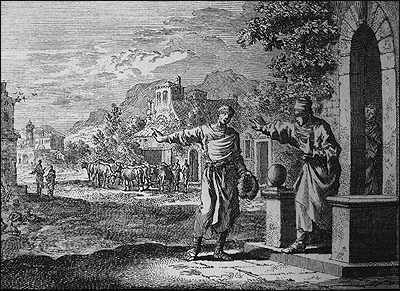
Home > Jesus > Parables of Jesus > Parable of the Great Banquet
 Parable of the Great Banquet
Parable of the Great Banquet
When one of those who were reclining at the table with Him heard this, he said to Him, “Blessed is everyone who will eat bread in the kingdom of God!”
16 But He said to him, “A man was giving a big dinner, and he invited many; 17 and at the dinner hour he sent his slave to say to those who had been invited, ‘Come; for everything is ready now.’ 18 But they all alike began to make excuses. The first one said to him, ‘I have bought a piece of land and I need to go out and look at it; please consider me excused.’ 19 Another one said, ‘I have bought five yoke of oxen, and I am going to try them out; please consider me excused.’ 20 Another one said, ‘I have married a wife, and for that reason I cannot come.’ 21 And the slave came back and reported this to his master. Then the head of the household became angry and said to his slave, ‘Go out at once into the streets and lanes of the city and bring in here the poor and crippled and blind and lame.’ 22 And the slave said, ‘Master, what you commanded has been done, and still there is room.’ 23 And the master said to the slave, ‘Go out into the highways and along the hedges, and compel them to come in, so that my house may be filled. 24 For I tell you, none of those men who were invited shall taste of my dinner.’” — Luke 14:16-24, NASB
The parable appears in Luke during a dinner of the Pharisees to which Jesus had been invited. He had just told the parable of the lowest seat as a commentary on their lack of humility and advised the host that he should invite the poor, crippled and lame as opposed to friends, family and the rich if he sought real blessings in heaven. When another attendee makes a presumptive remark about the blessedness of those who will be present at God’s table, Jesus responds with this parable of a great banquet. It is similar in story and purpose to the wedding feast analogy of Matthew 22:1-14 in which he condemns the Jewish establishment for their spiritual hypocrisy and rejection of Him.
The parable is straightforward. A man throws a lavish celebration and has invited many guests in advance. When the time for the event comes and everything is ready he sends out his slave to call the people who had been invited. Surprisingly none choose to attend, offering instead a variety of excuses. Moreover they are bad excuses, showing the contempt and slight regard they have for both the invitation and the host. The man angrily sends his slave back out with instructions to bring the poor, crippled, and lame from the streets to the dinner instead. After a while the slave reports back that he has done as instructed and there is still room. The man then tells his slave to invite everyone else from the highways and outskirts of town, vowing that none of the original invitees will be received.
The Pharisees were Israel’s foremost religious leaders at the time of Jesus’s earthly ministry. They are characterized in scripture as arrogant, self-entitled legalists who believed that their show of religiosity and excessive legal observances had gained God’s favor to the point that He would welcome them to the heavenly table, to the exclusion of everyone else they felt did not measure up to their excessive standards.
Because of their lineage, fanatical obedience to the law, high profile in the synagogues, and refusal to sort with common sinners, they believed themselves the only worthy invitees to God’s resurrection of the righteous. From their standpoint, Jesus—who associated with society’s outcasts and preached a message of repentance and salvation by grace—couldn’t possibly be the invitation. His truth contradicted their entire belief system, and so He was rejected outright despite being the long awaited Messiah.
These hardline hypocrites understood Jesus not at all. By failing to do so and rejecting Him, their spiritual privilege was revoked by God and they were deemed unworthy to be His stewards on earth or His saints in heaven. They will not taste of the dinner. Meanwhile, the invitation has been expanded to include all others willing and capable of accepting it: the poor in spirit and those outside of traditional Judaism.
The proper response to the gospel requires humility and recognition of one’s fallen state, things the Pharisees were incapable of. Convinced of their own righteousness, they put their faith in religion instead of Christ. Jesus told His followers that “many who are first will be last, and the last first.” Worldly status such as that the Pharisees enjoyed means nothing in heaven, and an outward show of piety and obedience does not validate a false faith. It is the true state of one’s heart only that matters before God. To be saved is to possess a heart that carries with it a spirit of repentance and complete surrender to Christ for redemption.
When a person hears the gospel message and does not act on it in repentance, faith, and obedience, they are essentially saying to God “please consider me excused” from the great banquet in heaven. To decline the offer of eternal life in His holy kingdom is to deprive one’s self of the fullness of life in Christ on this earth and everlasting fellowship with God beyond.
Image:
Luyken, Jan (1649-1712); Invitation to the Great Banquet; Medhurst, Phillip (attribution)
Scripture Alone • Faith Alone • Grace Alone • Christ Alone • To the Glory of God Alone
Most scripture quotations taken from the New American Standard Bible® (NASB)